新目标英语中考英语复习problims阅读写作复习
新目标英语九年级6-10单元阶段复习
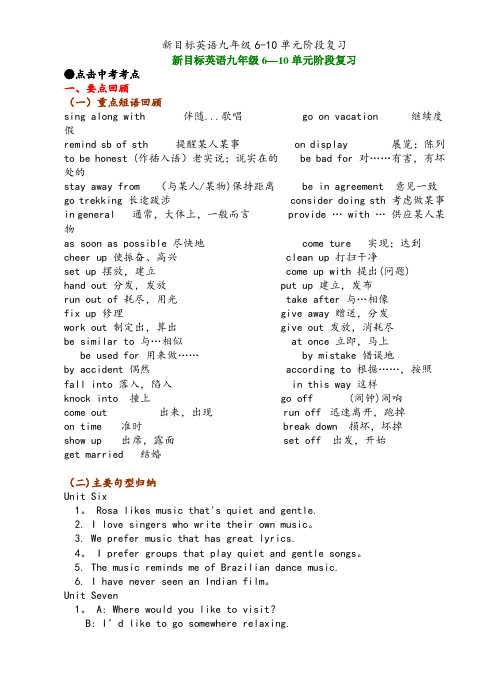
新目标英语九年级6—10单元阶段复习●点击中考考点一、要点回顾(一)重点短语回顾sing along with 伴随...歌唱 go on vacation 继续度假remind sb of sth 提醒某人某事 on display 展览;陈列to be honest (作插入语)老实说;说实在的 be bad for 对……有害,有坏处的stay away from (与某人/某物)保持距离 be in agreement 意见一致go trekking 长途跋涉 consider doing sth 考虑做某事in general 通常,大体上,一般而言 provide … with …供应某人某物as soon as possible 尽快地 come ture 实现;达到cheer up 使振奋、高兴 clean up 打扫干净set up 摆放,建立 come up with 提出(问题)hand out 分发,发放 put up 建立,发布run out of 耗尽,用光 take after 与…相像fix up 修理 give away 赠送,分发work out 制定出,算出 give out 发放,消耗尽be similar to 与…相似 at once 立即,马上be used for 用来做…… by mistake 错误地by accident 偶然 according to 根据……,按照fall into 落入,陷入 in this way 这样knock into 撞上 go off (闹钟)闹响come out 出来,出现 run off 迅速离开,跑掉on time 准时 break down 损坏,坏掉show up 出席,露面 set off 出发,开始get married 结婚(二)主要句型归纳Unit Six1。
Rosa likes music that's quiet and gentle.2. I love singers who write their own music。
2020届中考英语备考复习 作文

作文专题
【考情分析】 2013-2015 年广东省中考“读写综合”考点一览表
作文专题
【解题指导】 一、信息归纳 本部分的题干主要以短语为主,但题干经常含有定语从句,所以要认真审题,找出题干的关 键词,弄清楚要填的内容是什么,再从原文中找出相应信息并分析和归纳,从而得出答案。答案 主要以填短语为主,不需要将整句话抄下来。这部分的信息主要是人、物、地点、时间、事情、 原因、结果和标题等。 二、书面表达 书面表达是以 A 部分的内容为话题,然后围绕这个话题进行阐述,谈谈自己的看法。
作文专题
(二)必备词汇和句型
6)It is said/reported that...据说/报道... 7)There is no need to do sth 没有必要去做某事 8)As we all know, +句子 众所周知 (2)提建议 1)had better (not) do 最好(不)做某事 2)How/What about doing sth?做某事怎么样? 3)I think you should do sth 我认为你应该做某事 4)I suggest/advise that you should do sth 我建议你应该做某事 5)It’s better to do.做某事更好
2020届中考英语备考复习 作文
Teaching procedures
step I : Lead -in 必备词组 必备句型
Step II: language focuses 考点
考点专练 中考链接
必备词组
1. wake up 醒来 2. work out 算出,解决 3. worry about 担心,烦恼 4. write down 写下,记下 5. write to 写信给……
人教版中考英语中考英语总复习书面表达X知识点总结
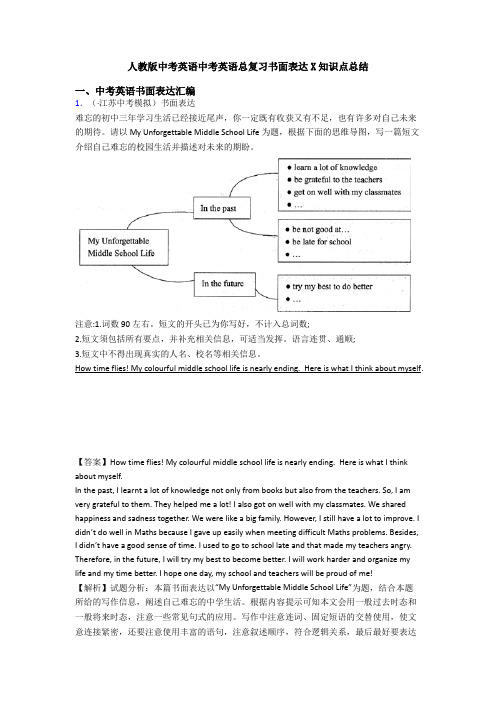
人教版中考英语中考英语总复习书面表达X知识点总结一、中考英语书面表达汇编1.(·江苏中考模拟)书面表达难忘的初中三年学习生活已经接近尾声,你一定既有收获又有不足,也有许多对自己未来的期待。
请以My Unforgettable Middle School Life为题,根据下面的思维导图,写一篇短文介绍自己难忘的校园生活并描述对未来的期盼。
注意:1.词数90左右。
短文的开头已为你写好,不计入总词数;2.短文须包括所有要点,并补充相关信息,可适当发挥。
语言连贯、通顺;3.短文中不得出现真实的人名、校名等相关信息。
How time flies! My colourful middle school life is nearly ending. Here is what I think about myself.【答案】How time flies! My colourful middle school life is nearly ending. Here is what I think about myself.In the past, I learnt a lot of knowledge not only from books but also from the teachers. So, I am very grateful to them. They helped me a lot! I also got on well with my classmates. We shared happiness and sadness together. We were like a big family. However, I still have a lot to improve. I didn’t do well in Maths because I gave up easily when meeting difficult Maths problems. Besides, I didn’t have a good sense of time. I used to go to school late and that made my teachers angry. Therefore, in the future, I will try my best to become better. I will work harder and organize my life and my time better. I hope one day, my school and teachers will be proud of me!【解析】试题分析:本篇书面表达以“My Unforgettable Middle School Life”为题,结合本题所给的写作信息,阐述自己难忘的中学生活。
人教版新目标版九年级英语作文总复习-初三英语作文总复习
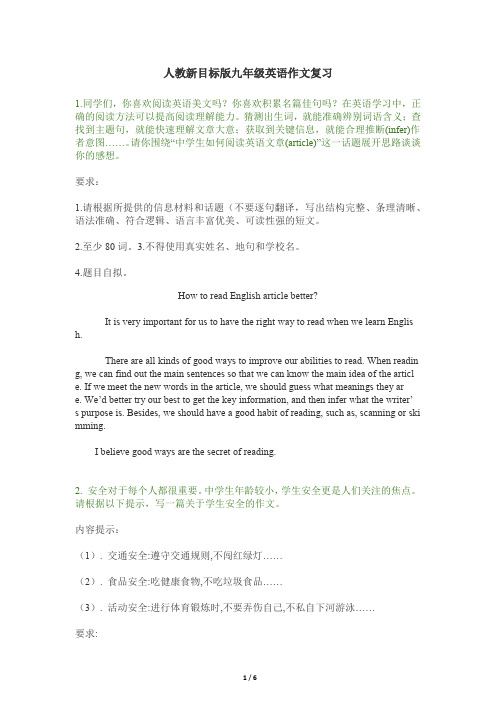
人教新目标版九年级英语作文复习1.同学们,你喜欢阅读英语美文吗?你喜欢积累名篇佳句吗?在英语学习中,正确的阅读方法可以提高阅读理解能力。
猜测出生词,就能准确辨别词语含义;查找到主题句,就能快速理解文章大意;获取到关键信息,就能合理推断(infer)作者意图……。
请你围绕“中学生如何阅读英语文章(article)”这一话题展开思路谈谈你的感想。
要求:1.请根据所提供的信息材料和话题(不要逐句翻译,写出结构完整、条理清晰、语法准确、符合逻辑、语言丰富优美、可读性强的短文。
2.至少80词。
3.不得使用真实姓名、地句和学校名。
4.题目自拟。
How to read English article better?It is very important for us to have the right way to read when we learn Englis h.There are all kinds of good ways to improve our abilities to read. When readin g, we can find out the main sentences so that we can know the main idea of the articl e. If we meet the new words in the article, we should guess what meanings they are. We’d better try our best to get the key information, and then infer what the writer’s purpose is. Besides, we should have a good habit of reading, such as, scanning or ski mming.I believe good ways are the secret of reading.2. 安全对于每个人都很重要。
中考英语作文怎么复习
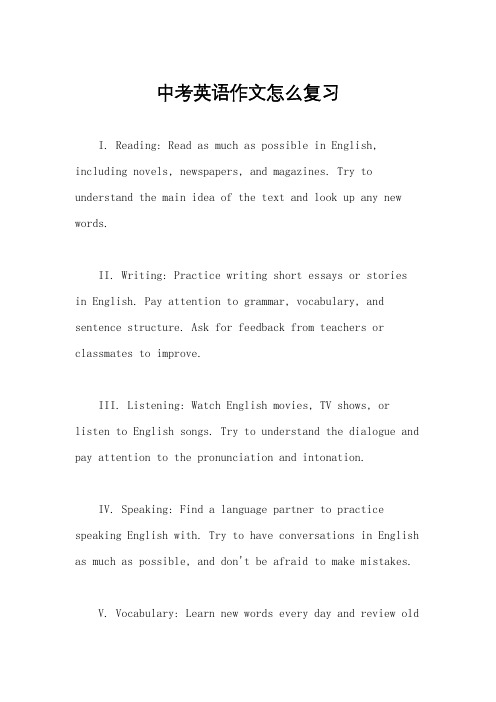
中考英语作文怎么复习I. Reading: Read as much as possible in English, including novels, newspapers, and magazines. Try to understand the main idea of the text and look up any new words.II. Writing: Practice writing short essays or storiesin English. Pay attention to grammar, vocabulary, and sentence structure. Ask for feedback from teachers or classmates to improve.III. Listening: Watch English movies, TV shows, or listen to English songs. Try to understand the dialogue and pay attention to the pronunciation and intonation.IV. Speaking: Find a language partner to practice speaking English with. Try to have conversations in English as much as possible, and don't be afraid to make mistakes.V. Vocabulary: Learn new words every day and review oldones. Use flashcards or vocabulary apps to help memorize and practice using them in sentences.VI. Grammar: Review the basic grammar rules andpractice using them in sentences. Pay attention to verb tenses, prepositions, and articles.VII. Test practice: Take practice tests to familiarize yourself with the format and types of questions. Time yourself to improve your speed and accuracy.VIII. Relax: Don't stress too much about the exam. Take breaks and relax to avoid burnout. Stay positive and confident in your abilities.。
人教版新目标英语 初三 中考总复习题型串讲提纲总结--任务型阅读 专讲
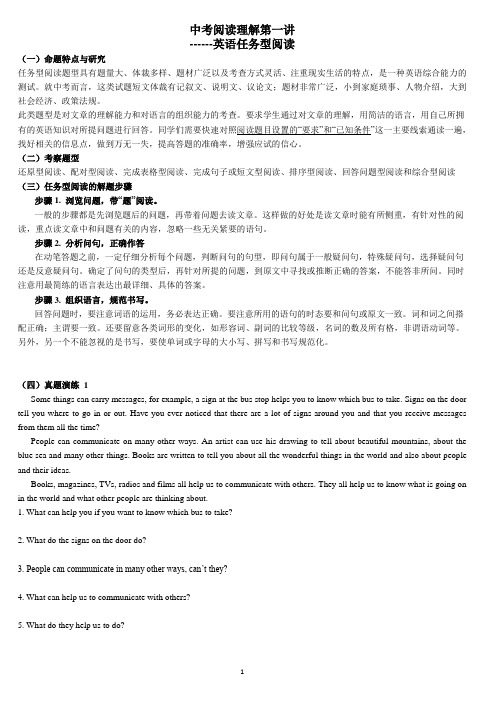
中考阅读理解第一讲------英语任务型阅读(一)命题特点与研究任务型阅读题型具有题量大、体裁多样、题材广泛以及考查方式灵活、注重现实生活的特点,是一种英语综合能力的测试。
就中考而言,这类试题短文体裁有记叙文、说明文、议论文;题材非常广泛,小到家庭琐事、人物介绍,大到社会经济、政策法规。
此类题型是对文章的理解能力和对语言的组织能力的考查。
要求学生通过对文章的理解,用简洁的语言,用自己所拥有的英语知识对所提问题进行回答。
同学们需要快速对照阅读题目设置的“要求”和“已知条件”这一主要线索通读一遍,找好相关的信息点,做到万无一失,提高答题的准确率,增强应试的信心。
(二)考察题型还原型阅读、配对型阅读、完成表格型阅读、完成句子或短文型阅读、排序型阅读、回答问题型阅读和综合型阅读(三)任务型阅读的解题步骤步骤1. 浏览问题,带“题”阅读。
一般的步骤都是先浏览题后的问题,再带着问题去读文章。
这样做的好处是读文章时能有所侧重,有针对性的阅读,重点读文章中和问题有关的内容,忽略一些无关紧要的语句。
步骤2. 分析问句,正确作答在动笔答题之前,一定仔细分析每个问题,判断问句的句型,即问句属于一般疑问句,特殊疑问句,选择疑问句还是反意疑问句。
确定了问句的类型后,再针对所提的问题,到原文中寻找或推断正确的答案,不能答非所问。
同时注意用最简练的语言表达出最详细、具体的答案。
步骤3. 组织语言,规范书写。
回答问题时,要注意词语的运用,务必表达正确。
要注意所用的语句的时态要和问句或原文一致。
词和词之间搭配正确;主谓要一致。
还要留意各类词形的变化,如形容词、副词的比较等级,名词的数及所有格,非谓语动词等。
另外,另一个不能忽视的是书写,要使单词或字母的大小写、拼写和书写规范化。
(四)真题演练 1Some things can carry messages, for example, a sign at the bus stop helps you to know which bus to take. Signs on the door tell you where to go in or out. Have you ever noticed that there are a lot of signs around you and that you receive messages from them all the time?People can communicate on many other ways. An artist can use his drawing to tell about beautiful mountains, about the blue sea and many other things. Books are written to tell you about all the wonderful things in the world and also about people and their ideas.Books, magazines, TVs, radios and films all help us to communicate with others. They all help us to know what is going on in the world and what other people are thinking about.1. What can help you if you want to know which bus to take?_________________________________________________________________________________2. What do the signs on the door do?_________________________________________________________________________________3. People can communicate in many other ways, can’t they?_________________________________________________________________________________4. What can help us to communicate with others?_________________________________________________________________________________5. What do they help us to do?_________________________________________________________________________________真题演练 2I am the youngest of five kids in my family. When I was young, my mother was a stay-at-home woman. I will never forget all the things she did for us. I still remember that my mother was always there, waiting for us at home when we got home from school. It made us happy to walk through the front door and be greeted with smiles and home-cooked meals. We weren’t rich, but my parents still tried to give us good food and clothes. Sometimes our mother would sew (缝制) some clothes for us. Later, when I was in middle school she decided to go to work. I still remember the first day of my middle school life. I came back to an empty house. There wasn’t a smile or a delicious meal at home. I was upset because nobody greeted me and asked about my day. At that time I realized how lucky we were to have our mother at home.Today, I am also a stay-at-home mother. I have three kids, a six-year-old girl and two boys. The elder boy is five years old and he is two years older than his younger brother. Even though I also want to go to work, I know that I am needed at home. So I won’t return to work until my kids are old enough. I hope I can leave them with wonderful memories (回忆) of warm smiles and home-cooked meals.1. How many sisters or brothers does the writer have?_____________________________________________________________________________2. Did the writer’s mother go to work when the writer was in primary school?_____________________________________________________________________________3. Why did the writer feel upset when she got back home on the first day of her middle school life?_____________________________________________________________________________4. How old is the writer’s younger son?_____________________________________________________________________________5. What does the writer want to tell us in the last paragraph? (Use at most three sentences)_____________________________________________________________________________真题演练 3Grown-ups are always telling kids what to do. Do you listen to them? Usually they know what is best for you,but sometimes they can be wrong.So,many countries have a special law(法律)to keep people under 18 safe. How the law works? Teachers can punish bad students,but they cannot just do anything they like. If a teacher tries to kick(踢)you out of class,you can go to the headmaster and tell him you have the right to stay in school. School buildings and playgrounds must also be safe for children. If the things you use in P.E.class are unsafe,the law says the school must fix them or get new ones. Do you know anyone who can’t go to school because their parents aren’t willing to pay for it? This is also against the law,which says parents must h ave their kids in school.Kids have a right to privacy(隐私)under the law,which says parents and teachers cannot read children’s own letters.The law also protects children’s health.It says there should be no smoking in schools and other places where many teenagers go.Have you ever wondered why tickets for parks and museums are cheaper for students? It’s also because of the law. It says that kids need to have lots of chances to learn.1.Who can you get help from when your teacher tries to kick you out of class?______________________________________________________________2.What can you do if the things you use in P.E.class are unsafe ?______________________________________________________________3.Is it right if your parents don’t pay for your schooling?_____________________________________________________________4.Why are the tickets for parks and museums for students cheaper according to the law?______________________________________________________________5.What’s the purpose of making this special law?______________________________________________________________。
中考一轮复习新目标英语八年级(Units 3-4)
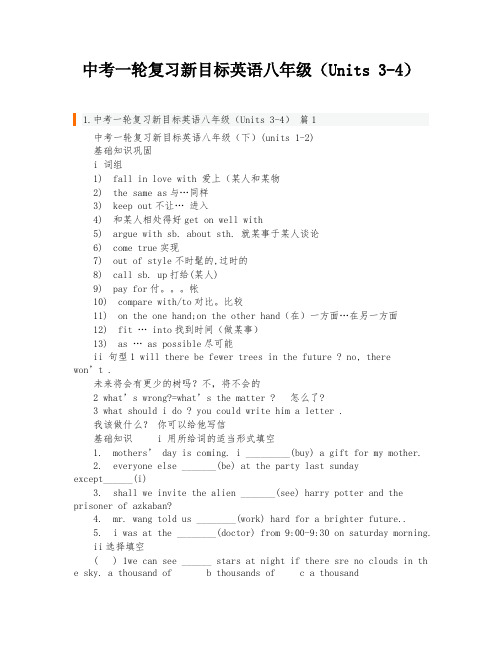
中考一轮复习新目标英语八年级(Units 3-4)1.中考一轮复习新目标英语八年级(Units 3-4)篇1中考一轮复习新目标英语八年级(下)(units 1-2)基础知识巩固i 词组1) fall in love with 爱上(某人和某物2) the same as与…同样3) keep out不让… 进入4) 和某人相处得好get on well with5) argue with sb. about sth. 就某事于某人谈论6) come true实现7) out of style不时髦的,过时的8) call sb. up打给(某人)9) pay for付。
帐10) compare with/to对比。
比较11) on the one hand;on the other hand(在)一方面…在另一方面12) fit … into找到时间(做某事)13) as … as possible尽可能ii 句型1 will there be fewer trees in the future ? no, therewon’t .未来将会有更少的树吗?不,将不会的2 what’s wrong?=what’s the matter ?怎么了?3 what should i do ? you could write him a letter .我该做什么?你可以给他写信基础知识 i 用所给词的适当形式填空1. mothers’ day is coming. i _________(buy) a gift for my mother.2. everyone else _______(be) at the party last sundayexcept______(i)3. shall we invite the alien _______(see) harry potter and the prisoner of azkaban?4. mr. wang told us ________(work) hard for a brighter future..5. i was at the ________(doctor) from 9:00-9:30 on saturday morning.ii选择填空( ) 1we can see ______ stars at night if there sre no clouds in th e sky. a thousand of b thousands of c a thousand( ) 2she doesn’t want to talk ______it ______the phone.a. over, aboutb. with, onc. about, ond. to, over( )3 the students found ________ difficult to work out the maths problems .a thatb itc oned this( ) 4 tell your friend _______buy the same clothes as you do.a. don’tb. notc. not tod. don’t to( )5 there will be even_______ pressure in 10 years.a. littleb. fewc. mored. fewer( )6 there will be _______ healthy food in the future because of all kinds of pollution .a fewerb lessc muchd more( ) 7there _______a personal computer in his or her home .a is going to haveb will havec is going to bed are going to be( )8 _____ do you think jane will be in 2020? ---- she will be a famous nurse. a who b what c how d when( )9---with the mac hine , we can do the work with ______ money and _______ people .----that sounds wonderfula less, fewerb fewer,lessc fewer, fewerd les, less( )10 my father got really _______me because i ________my physics test.a. angrily with, passedb. angry with, failedc. angrily at , passedd. angrily at, failed.iii句型转换1 there will be fewer cars twenty years from now.(一般疑问句并做否定回答)______ there _____ fewer cars twenty years from now.? no,_________ _______2he seemed to know the whole thing同意句改写)______ ______ that he knew the whole thing3 there won’t be as much pollution in the future as now .(同意句改写)there will _______ _______ ____________ in the future than now4 the teacher is so kind that all the students like her . 同意句改写)she is _____ a kind teacher ______ all the students like her .5 most people will never use telephones.(改为被动语态)telephones will never _______ ________ ________most people.6 it’s bad for your health to play the cds too loud. (同义改写)_______ the cds too loud ______ bad for your health.完成句子1明天的天气将会如何?___will the weather___ __ tomorrow?2 我的好朋友的生活方式和我一样。
人教版新目标九年级英语复习集锦
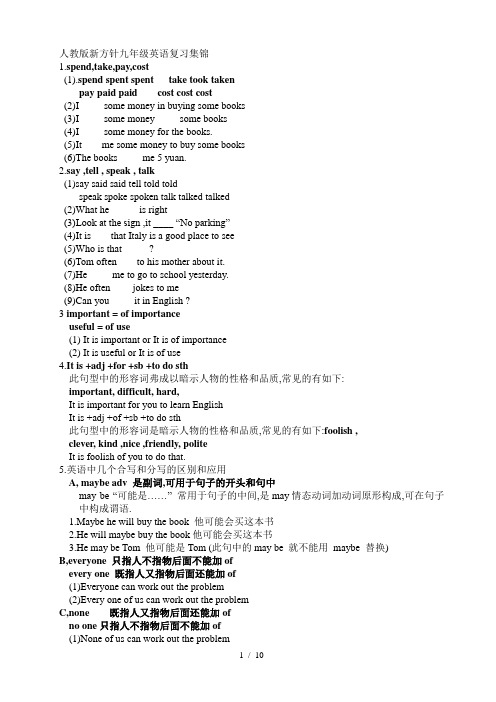
人教版新方针九年级英语复习集锦1.spend,take,pay,cost(1).spend spent spent take took takenpay paid paid cost cost cost(2)I ____ some money in buying some books(3)I ____ some money ____ some books(4)I ____ some money for the books.(5)It ___ me some money to buy some books(6)The books ____ me 5 yuan.2.say ,tell , speak , talk(1)say said said tell told toldspeak spoke spoken talk talked talked(2)What he _____ is right(3)Look at the sign ,it ____ “No parking”(4)It is ___ that Italy is a good place to see(5)Who is that _____?(6)Tom often ___ to his mother about it.(7)He ____ me to go to school yesterday.(8)He often ____jokes to me(9)Can you ____ it in English ?3 important = of importanceuseful = of use(1) It is important or It is of importance(2) It is useful or It is of use4.It is +adj +for +sb +to do sth此句型中的形容词弗成以暗示人物的性格和品质,常见的有如下:important, difficult, hard,It is important for you to learn EnglishIt is +adj +of +sb +to do sth此句型中的形容词是暗示人物的性格和品质,常见的有如下:foolish ,clever, kind ,nice ,friendly, politeIt is foolish of you to do that.5.英语中几个合写和分写的区别和应用A, maybe adv 是副词,可用于句子的开头和句中may be “可能是……” 常用于句子的中间,是may情态动词加动词原形构成,可在句子中构成谓语.1.Maybe he will buy the book 他可能会买这本书2.He will maybe buy the book他可能会买这本书3.He may be Tom 他可能是Tom (此句中的may be 就不能用maybe 替换)B,everyone 只指人不指物后面不能加ofevery one 既指人又指物后面还能加of(1)Everyone can work out the problem(2)Every one of us can work out the problemC,none 既指人又指物后面还能加ofno one只指人不指物后面不能加of(1)None of us can work out the problem(2)No one can work out the problemD, (1)Who is in the classroom? No one 没有人(2)How many boys are there in your room?None (没有人)(3)What is in your box? Nothing (什么也没有?)E,everyday 用做定语,放在名词的前面“日常的,每天的”every day 用做状语,放在句首和句尾“每天”We practice everyday English every day.我们每天练习日常用语。
(杭州专版)2020中考英语复习方案专题01考纲核心词汇分类试题人教新目标版
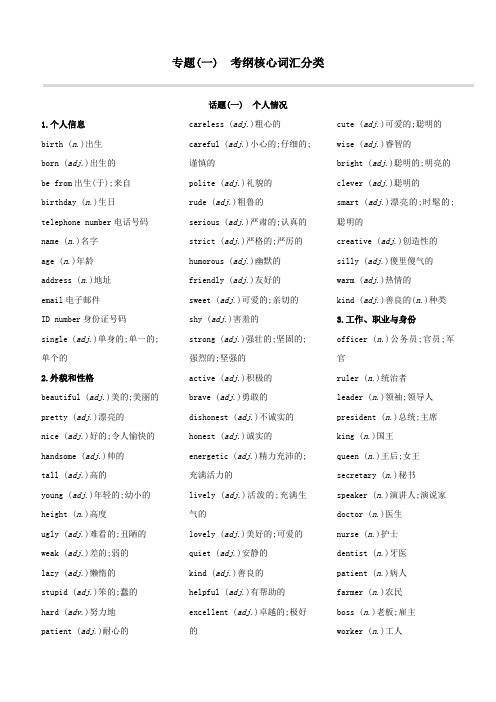
专题(一) 考纲核心词汇分类话题(一) 个人情况1.个人信息birth (n.)出生born (adj.)出生的be from出生(于);来自birthday (n.)生日telephone number电话号码name (n.)名字age (n.)年龄address (n.)地址email电子邮件ID number身份证号码single (adj.)单身的;单一的;单个的2.外貌和性格beautiful (adj.)美的;美丽的pretty (adj.)漂亮的nice (adj.)好的;令人愉快的handsome (adj.)帅的tall (adj.)高的young (adj.)年轻的;幼小的height (n.)高度ugly (adj.)难看的;丑陋的weak (adj.)差的;弱的lazy (adj.)懒惰的stupid (adj.)笨的;蠢的hard (adv.)努力地patient (adj.)耐心的careless (adj.)粗心的careful (adj.)小心的;仔细的;谨慎的polite (adj.)礼貌的rude (adj.)粗鲁的serious (adj.)严肃的;认真的strict (adj.)严格的;严厉的humorous (adj.)幽默的friendly (adj.)友好的sweet (adj.)可爱的;亲切的shy (adj.)害羞的strong (adj.)强壮的;坚固的;强烈的;坚强的active (adj.)积极的brave (adj.)勇敢的dishonest (adj.)不诚实的honest (adj.)诚实的energetic (adj.)精力充沛的;充满活力的lively (adj.)活泼的;充满生气的lovely (adj.)美好的;可爱的quiet (adj.)安静的kind (adj.)善良的helpful (adj.)有帮助的excellent (adj.)卓越的;极好的cute (adj.)可爱的;聪明的wise (adj.)睿智的bright (adj.)聪明的;明亮的clever (adj.)聪明的smart (adj.)漂亮的;时髦的;聪明的creative (adj.)创造性的silly (adj.)傻里傻气的warm (adj.)热情的kind (adj.)善良的(n.)种类3.工作、职业与身份officer (n.)公务员;官员;军官ruler (n.)统治者leader (n.)领袖;领导人president (n.)总统;主席king (n.)国王queen (n.)王后;女王secretary (n.)秘书speaker (n.)演讲人;演说家doctor (n.)医生nurse (n.)护士dentist (n.)牙医patient (n.)病人farmer (n.)农民boss (n.)老板;雇主worker (n.)工人manager (n.)经理staff (n.)全体职员soldier (n.)士兵;战士enemy (n.)敌人police (n.)警察;警察部门policeman (n.)男警察policewoman (n.)女警察guard (n.)卫兵;警卫postman (n.)邮递员reporter (n.)记者photographer (n.)摄影师listener (n.)听者actor (n.)(男)演员actress (n.)女演员player (n.)演奏者director (n.)指导者;导演writer (n.)作家singer (n.)歌手teacher (n.)教师student (n.)学生classmate (n.)同班同学monitor (n.)班长pupil (n.)小学生teenager (n.)(13至19岁的)青少年driver (n.)司机pilot (n.)飞行员captain (n.)船长;队长;(海军)上校passenger (n.)乘客owner (n.)物主;所有人musician (n.)音乐家waiter (n.)男服务员waitress (n.)女服务员engineer (n.)工程师scientist (n.)科学家traveller (n.)旅行者;观光者artist (n.)艺术话题(二) 家庭、朋友和周围的人1.家人与亲友family (n.)家庭;子女relative (n.)亲属;亲戚relationship (n.)关系couple (n.)夫妻parent (n.)父亲;母亲grandparent (n.)(外)祖父;(外)祖母grandpa=grandfather (n.)(外)祖父grandma=grandmother (n.)(外)祖母grandchild (n.)(外)孙子;(外)孙女;孙辈granddaughter (n.)(外)孙女father (n.)父亲dad=daddy (n.)(口语)爸爸;爹爹mother (n.)母亲mum(美mom) (n.)妈妈uncle (n.)叔;伯;舅;姑父;姨父aunt (n.)伯母;舅母;婶;姑;姨brother (n.)兄;弟sister (n.)姐;妹son (n.)儿子daughter (n.)女儿cousin (n.)堂(表)兄、弟;堂(表)姐、妹wife (n.)妻子husband (n.)丈夫friend (n.)朋友2.其他人human (n.)人类people (n.)人们;人person (n.)(单数)人gentleman (n.)绅士;男士stranger (n.)陌生人hero (n.)英雄pioneer (n.)先锋;先驱neighbour(美neighbor) (n.)邻居;邻人neighbourhood(美neighborhood)(n.)某街区(或城区)的居民child (n.)孩子;儿童woman (n.)妇女man (n.)成年男人;人;人类girl (n.)女孩boy (n.)男孩kid (n.)小孩baby (n.)婴儿elder (n.)长辈;前辈lady (n.)女士Miss (n.)小姐;女士guest (n.)客人;宾客member (n.)成员;会员guy (n.)家伙;伙计话题(三) 周围环境1.政府、教育、医疗government (n.)政府document (n.)公文;文件board (n.)委员会;(政府的)部organisation(美organization) (n.)组织organise (v.)把……组织起来;组织notice (n.)布告;通告educate (v.)教育;培养education (n.)教育;培养medical (adj.)医学的;医疗的treatment (n.)治疗;疗法operate (v.)动手术operation (n.)手术medicine (n.)药army (n.)军队law (n.)法律right (n.)权利act (n.)法令;条例gun (n.)枪2.农业、工业、商业周边countryside (n.)农村地区;乡下local (adj.)地方的;当地的village (n.)村庄;乡村farm (n.)农场;农庄field (n.)农田;牧场;场地business (n.)生意;交易;事业industry (n.)工业company (n.)公司market (n.)市场;集市supermarket (n.)超级市场factory (n.)工厂equipment (n.)装备;设备sign (n.)记号;标记;招牌;符号manage (v.)设法做到;管理produce (vt.)生产;制造production (n.)产物;产品instruction (n.)说明;须知meeting (n.)会议robot (n.)机器人3.房屋周边home (n.)家(adv.)回家hometown (n.)家乡house (n.)房子flat (n.)公寓address (n.)地址yard (n.)院子;码door (n.)门window (n.)窗户glass (n.)玻璃gate (n.)大门floor (n.)地板;地面garden (n.)花园gallery (n.)走廊stairs (n.)楼梯court (n.)庭院wall (n.)墙bathroom (n.)浴室;卫生间bedroom (n.)卧室kitchen (n.)厨房study (n.)书房4.城市设施town (n.)城镇building (n.)建筑物;大楼community (n.)社区block (n.)街区corner (n.)角落bridge (n.)桥church (n.)教堂museum (n.)博物馆gym=gymnasium (n.)体育馆gallery (n.)画廊company (n.)公司hospital (n.)医院toilet (n.)厕所hotel (n.)旅馆post office邮局library (n.)图书馆cinema (n.)电影院theatre (美theater)(n.)剧场;戏院row (n.)(剧院、电影院的)一排座位club (n.)俱乐部restaurant (n.)饭馆;饭店hall (n.)大厅;礼堂square (n.)广场store (n.)商店tower (n.)塔court (n.)法庭;球场palace (n.)宫殿5.生活用品handbag (n.)手提包wallet/purse (n.)钱包lock (n.&v.)锁key (n.)钥匙line (n.)绳索;路线basket (n.)篮子battery (n.)电池camera (n.)照相机electricity (n.)电;电流fire (n.)火candle (n.)蜡烛soap (n.)肥皂brush (n.)刷;刷子sunglasses (n.)太阳镜watch (n.)手表clock (n.)钟tool (n.)工具card (n.)名片;纸牌stamp (n.)邮票cigarette (n.)香烟diary (n.)日记;日记簿calendar (n.)日历;日历书doll (n.)玩偶toy (n.)玩具scissors (n.)剪刀umbrella (n.)雨伞match (n.)火柴alarm (n.)警报器net (n.)网rope (n.)绳子photo (n.)照片safe (n.)保险箱circle (n.&v.)圆圈;画圆圈;环绕fridge=refrigerator (n.)冰箱record (n.)记录;唱片recorder (n.)录音机telephone (n.)电话video (n.)录像;视频fan (n.)风扇picture (n.)图片;照片kite (n.)风筝radio (n.)收音机tape (n.)磁带Internet (n.)因特网keyboard (n.)键盘menu (n.)菜单screen (n.)屏幕computer (n.)电脑6.天气weather (n.)天气sunny (adj.)晴朗的cloudy (adj.)多云的wind (n.)风windy (adj.)有风的;多风的snow (v.)下雪(n.)雪snowy (adj.)下雪的;多雪的rain (v.)下雨(n.)雨水rainy (adj.)下雨的;多雨的dry (adj.)干的;干燥的wet (adj.)湿的;潮湿的cold (adj.)冷的;寒冷的hot (adj.)热的warm (adj.)暖和的;温暖的cool (adj.)凉的;凉爽的lift (v.)(云、烟等)消散sunshine (n.)阳光shine (v.)发光;照耀shower (n.)阵雨storm (n.)风暴;暴风雨zero (n.)零度temperature (n.)温度degree (n.)度;度数(温度单位)heat (n.)热;温度7.节假日festival (n.)节日traditional (adj.)传统的spend (v.)度过sight (n.)情景;风景sightseeing (n.)观光;游览holiday (n.)假日;假期vacation (n.)假期;休假Christmas (n.)圣诞节gift (n.)礼物;恩赐话题(四) 时间(点、段、频率)和程度1.时间点和时间段o'clock (n.)点钟noon (n.)中午quarter (n.)一刻钟present (adj.)现在的when (conj.)当……的时候today (adv.&n.)今天;现在;当前tomorrow (adv.&n.)明天yesterday (adv.&n.)昨天tonight (adv.&n.)今晚morning (n.)早晨;上午afternoon (n.)下午evening (n.)傍晚;晚上second (n.)秒minute (n.)分钟;一会儿;瞬间hour (n.)小时month (n.)月year (n.)年century (n.)世纪;百年future (n.)将来period (n.)阶段;时期time (n.)时间;次数after (adv.&prep.&conj.)在后来;在……之后before (conj.)在……之前;以前ago (adv.)以前later (adv.)后来late (adj.)迟的;晚的early (adj.)早的during (prep.)在……期间recently (adv.)最近since (prep.)自从for (prep.)持续一段时间soon (adv.)不久until (prep.&conj.)直到……为止while (conj.)在……的时候;和……同时by (prep.)到……时间;不迟于last (v.)持续forever (adv.) 永远week (n.)星期;周Monday (n.)星期一Tuesday (n.)星期二Wednesday (n.)星期三Thursday (n.)星期四Friday (n.)星期五Saturday (n.)星期六Sunday (n.)星期日weekday (n.)工作日date (n.)日期month (n.)月份January (n.)一月February (n.)二月March (n.)三月April (n.)四月May (n.)五月June (n.)六月July (n.)七月August (n.)八月September (n.)九月October (n.)十月November (n.)十一月December (n.)十二月2.频率和程度never (adv.)绝不;从来没有hardly (adv.)几乎不sometimes (adv.)有时often (adv.)常常;经常usually (adv.)通常always (adv.)总是;一直;永远once (adv.)一次twice (adv.)两次daily (adj.)每天的every (adj.)每一;每个的regular (adj.)规则的;定期的again (adv.)再一次;再;又already (adv.)已经ever (adv.)曾经;无论何时still (adv.)仍然;还yet (adv.)尚;还;仍然rather (adv.)相当;稍微quite (adv.)完全;十分even (adv.)甚至;连(……都) too (adv.)太;过分;很;非常just (adv.)恰好;仅only (adv.)仅仅;只;才so (adv.)如此;这么then (adv.)那么话题(五) 日常活动1.动作、状态、活动let (v.)让use (v.)利用;使用blow (v.)吹nod (v.)点头shake (v.)摇晃watch (v.)观看;注视notice (v.)注意到guess (v.)猜suppose (v.)猜想listen (v.)听hear (v.)听到feel (v.)感觉;觉得sound (v.)发出声音(n.)声音read (v.)读shout (v.)大喊chat (v.&n.)聊天;闲聊taste (v.)有……味道;品尝smell (v.)闻;嗅kiss (v.)吻;亲吻pull (v.)拉push (v.)推rush (v.)冲;奔touch (v.)接触;触摸glue (v.)粘贴;粘合(n.)胶水point (v.)指出wave (v.)挥舞lift (v.)举起;抬起close (v.)关闭give (v.)给take (v.)拿;取knock (v.)敲;打;击hit (v.)打;击中catch (v.)捉住hold (v.)握住dig (v.)挖;掘write (v.)写print (v.)打印pick (v.)拾起;挑选steal (v.)偷put (v.)放pour (v.)灌;倒fill (v.)装满cut (v.)切;剪;削throw (v.)扔make (v.)制造;做hang (v.)悬挂;吊着hide (v.)躲藏stand (v.)站立shut (v.)关separate (v.)分开(adj.)分开的mix (v.)混合;混在一起lay (v.)放置;产卵divide (v.)划分;使分离direct (v.)指挥;导演(adj.)直接的;直达的control (v.)控制prepare (v.)准备prepared (adj.)有准备的consider (v.)考虑collect (v.)收集compare (v.)比较complete (v.)完成know (v.)知道;了解cancel (v.)取消build (v.)建造follow (v.)跟随;跟着rest (v.)休息force (v.)迫使(n.)力量;武力get (v.)得到;到达;变得hurry (v.)赶快;迅速移动become (v.)成为happen (v.)发生wait (v.)等候continue (vi.)继续agree (v.)同意;应允accept (v.)接受allow (vt.)允许;准许refuse (v.)拒绝;不愿receive (v.)收到;接收against (prep.)反对save (vt.)救;挽救safe (adj.)安全的risk (v.)冒险protect (vt.)保护prevent (vt.)防止;预防avoid (v.)避免;躲开;逃避borrow (v.)(向别人)借用;借lend (vt.)借(出);把……借给keep (v.)保存return (v.)归还bring (vt.)拿来;带来;取来take (vt.)带走fetch (vt.)(去)取来,(去)带来carry (vt.)拿;搬;带;提;抬;背;抱show (v.)给……看(n.)展示;展览(会)outdoor (adj.)户外的outdoors (adv.)户外地walk (v.)步行;散步climb (v.)爬;攀登picnic (n.&v.)野餐obey (v.)遵守kill (v.)杀死;弄死punish (v.)惩罚;处罚warn (v.)警告;预先通知break (v.)打破;损坏;撕开fight (n.&v.)打架work (vi.)工作;(机器等)运转;活动have (vt.)有own (adj.)自己的(v.)拥有appear (v.)出现;显露remain (v.)保持;逗留;剩余need (v.)需要(n.)需要;需求require (v.)需要;要求search (v.)搜索post (v.)邮递send (v.)发送2.生活起居live (v.)生活;居住wear (v.)穿;戴sleep (v.)睡觉store (v.)储存repair (v.)修理fix (v.)修理;安装burn (v.)燃烧boil (v.)煮沸clean (v.)弄干净;打扫wash (v.)洗涤;冲洗water (v.)浇水light (v.)点燃tidy (v.)弄干净(adj.)整洁的litter (v.)乱丢垃圾eat (v.)吃order (v.)订购wake (v.)醒来;叫醒sweep (v.)打扫raise (vt.)养育marry (v.)(使)成婚;结婚online (adj.)在线的awake (adj.)醒着的activity (n.)活动habit (n.)习惯experience (n.)经验;经历lifestyle (n.)生活方式website (n.)网站email (n.)电子邮件(v.)发邮件message (n.)(书面或口头的)信息;消息party (n.)晚会;聚会life (n.)生活meal (n.)一餐(一顿饭)haircut (n.)理发housework (n.)家务action (n.)动作;行动3.发展变化add (v.)添加;增加increase (v.&n.)增加;繁殖improve (vt.)改进;更新progress (n.)进步;上进;进展;进行raise (vt.)(使)升高rise (vi.)上升;上涨develop (v.)(使)发展、发达;(使)发育development (n.)发展;发达grow (v.)生长;发育;种植;变成fall (vi.)落(下);降落;倒drop (v.)掉下;落下weak (adj.)差的;弱的;淡的instead (adv.)代替;顶替like (prep.)像;跟……一样camp (vi.)野营;宿营(n.)(夏令)营copy (v.)复制(n.)备份;一本话题(六) 学校、学习、文化、科学、爱好1.学校设施school (n.)学校college (n.)学院university (n.)大学grade (n.)年级;成绩blackboard (n.)黑板lab=laboratory (n.)实验室office (n.)办公室playground (n.)操场2.物品schoolbag (n.)书包crayon (n.)蜡笔;颜色笔eraser (n.)橡皮rubber (n.)橡胶;橡皮擦page (n.)页ruler (n.)尺子ink (n.)墨水map (n.)地图note (n.&vt.)便条;笔记;注释notebook (n.)笔记本dictionary (n.)字典paper (n.)纸seat (n.)座位bell (n.)铃;钟chalk (n.)粉笔flag (n.)旗flash (n.)闪光灯3.读物article (n.)文章art (n.)艺术play (n.)戏剧poem (n.)诗story (n.)故事;小说comment (n.)意见;评论theme (n.)主题character (n.)品质;角色text (n.)文本document (n.)文件news (n.)新闻newspaper (n.)报纸magazine (n.)杂志passage (n.)(文章等的)一节;一段form (n.)表格;形式;结构joke (n.)笑话daily (n.)日报(adj.)每日的copy (n.)抄本cartoon (n.)漫画topic (n.)话题symbol (n.)符号;标志;象征4.学科subject (n.)学科English (n.)英语Chinese (n.)语文maths(美math) (n.)数学science (n.)科学art (n.)美术music (n.)音乐PE (n.)体育history (n.)历史geography (n.)地理physics (n.)物理chemistry (n.)化学primary (adj.)初级的;初等的middle (adj.)中级的5.问题question (n.)问题(vt.)询问answer (v.&n.)回答;回复key (n.)答案;钥匙reply (n.)回答;答复ask (v.)询问problem (n.)问题;难题trouble (n.)问题;麻烦6.学习内容knowledge (n.)知识homework (n.)家庭作业project (n.)课题;作业;项目lesson (n.)功课;教训text (n.)文本;课文unit (n.)单元sentence (n.)句子pronounce (v.)发音pronunciation (n.)发音language (n.)语言document (n.)文件;公文skill (n.)技能;技巧letter (n.)字母;信word (n.)单词expression (n.)词语;表达material (n.)材料grammar (n.)语法composition (n.)作文object (n.)目标;物体;宾语7.学习过程teach (v.)教learn (v.)学;学会method (n.)方法;办法explain (v.)解释;说明experiment (n.)实验research (n.)研究practice (n.)练习practise (美practice) (v.)练习;实践correct (v.)纠正;改正(adj.)正确的;恰当的attention (n.)注意;关心solve (v.)解决;解答(难题等) mistake (n.)错误(v.)弄错understand (v.)明白;理解;懂得express (v.)表达translate (v.)翻译course (n.)过程;课程train (v.)培训training (n.)训练create (v.)创造survey (n.)调查task (n.)任务progress (n.)进步;进展meaning (n.)意义;意思mark (v.)标记rule (n.&v.)规定;统治term (n.)学期;术语group (n.)组;群team (n.)队line (n.)排;行8.学习评估exam=examination (n.)考试;测试;检查;审查test (vt.&n.)测试;考查;试验level (n.)水平standard (n.&adj.)标准;标准的score (n.)成绩result (n.)结果;效果competition (n.)比赛;竞赛prize (n.)奖品;奖金award (v.)授予;给予奖(金)speech (n.)演讲discuss (vt.)讨论fail (v.)失败;不及格;衰退lose (v.)失去;失败pass (vt.)通过improve (vt.)改进;更新reply (n.&v.)回答;答复repeat (v.)重复check (vt.)校对;核对;检查;批改9.历史文化social (adj.)社会的society (n.)社会;群体ancient (adj.)古代的;古老的ancestor (n.)祖先spread (v.)传播;延伸culture (n.)文化custom (n.)习俗;习惯;传统war (n.)战争10.科学技术invent (vt.)创造;发明invention (n.)发明;创造machine (n.)机器technology (n.)科技;技术science (n.)科学scientific (adj.)科学的electronic (adj.)电子的11.兴趣爱好like (vt.)喜欢;喜爱enjoy (vt.)欣赏;享受……的乐趣;喜欢love (n.)爱(vt.)热爱;很喜欢prefer (v.)更喜欢(=like…better)satisfy (v.)使……满意favourite (美favorite)(adj.)喜爱的(n.)特别喜爱的人或物care (v.)关心;在乎hate (vt.&n.)恨;讨厌hobby (n.)业余爱好;嗜好interest (n.)兴趣;趣味fan (n.)(电影、运动等的)迷;爱好者话题(七) 人际关系与情感1.交际meet (v.)遇见;会面miss (v.)漏掉;失误;错过connect (vt.)连接;把……联系起来communicate (v.)交际;传达communication (n.)交流;通讯together (adv.)一起conversation (n.)谈话;交流discuss (vt.)讨论;议论discussion (n.)讨论praise (v.)赞扬treat (v.)对待introduce (vt.)介绍introduction (n.)介绍postcard (n.)明信片attend (v.)参加public (adj.)公共的(n.)公众sorry (adj.)对不起;抱歉;难过的pardon (v.)请再说一遍;原谅excuse (n.)借口;辩解(vt.)原谅;宽恕mind (v.)介意invite (vt.)邀请;招待ask (v.)请求;要求share (v.)分享;共有greeting (n.)问候secret (n.)秘密ability (n.)能力absent (adj.)缺席的;不在的idea (n.)主意;意见;打算;想法thought (n.)思考;思想;念头view (n.)观点;意见(v.)查看;观察comment (n.)意见;评论purpose (n.)目的;意图advice (n.)忠告;建议;劝告advise (v.)忠告;建议;劝告opinion (n.)意见;看法;主张against (prep.)反对believe (v.)相信wonder (v.)想知道say (vt.)说;讲talk (n.&v.)谈话;讲话;演讲;交谈speak (v.)说;讲;谈话;发言tell (vt.)告诉;讲述;吩咐voice (n.)说话声reason (vi.)推论;劝说promise (v.)保证;发誓explain (vt.)解释;说明mention (v.)提及;提到;说起mean (v.)意思是;意味着help (n.&vt.)帮助;帮忙discover (vt.)发现discovery (n.)发现invent (vt.)发明;创造invention (n.)发明;创造create (vt.)创造;造成2.心情sad (adj.)(使人)悲伤的unhappy (adj.)不幸的;不快乐的cry (n.)叫喊;哭声(v.)喊叫;哭surprise (vt.)使惊奇;使诧异(n.)惊奇;诧异surprised (adj.)惊讶的amazing (adj.)令人惊异的shock (n.)震惊(v.)使震惊bored (adj.)厌倦的;厌烦的sleepy (adj.)困乏的tired (adj.)累的wild (adj.)感情炽热的;高兴的worry (n.)烦恼;担忧(v.)发愁;困扰worried (adj.)担忧的;烦恼的trouble (vt.)使苦恼;使忧虑;使麻烦(n.)烦恼;麻烦nervous (adj.)紧张不安的pity (n.)怜悯;同情regret (v.)后悔fear (n.&v.)害怕;恐惧afraid (adj.)害怕的;担心的panic (n.)恐慌(v.)(使)恐慌strange (adj.)奇怪的angry (adj.)生气的;愤怒的shame (n.)可惜;羞愧mad (adj.)生气的;疯狂的alone (adj.)孤单的;单独的lonely (adj.)孤独的express (vt.)表达;表示;表现expression (n.)表情;表现feeling (n.)感情;感觉crazy (adj.)疯狂的;热衷的happy (adj.)幸福的glad (adj.)高兴的;乐意的pleased (adj.)高兴的excited (adj.)兴奋的pleasure (n.)高兴;愉快cheer (v.)欢呼;喝彩pride (n.)自豪proud (adj.)自豪的;骄傲的laugh (n.&v.)笑;大笑;嘲笑smile (n.&v.)微笑3.希望、愿望与打算sense (n.)感觉(v.)感觉到hope (n.&v.)希望wish (n.)愿望;祝愿(v.)希望;想要;祝愿expect (vt.)预料;盼望;认为dream (n.)梦;梦想(vt.)做梦;梦想luck (n.)运气lucky (adj.)幸运的imagine (vt.)想象;设想want (v.)想要plan (n.&v.)计划;打算decide (v.)决定;下决心decision (n.)决定depend (vi.)依靠;依赖;指望;取决于resolution (n.)决定;决心4.记忆与评价memory (n.)回忆;记忆remember (v.)记得;想起forget (v.)忘记;忘掉impress (v.)给……以深刻的印象;使铭记missing (adj.)丢失的think (v.)想;认为;考虑perfect (adj.)完美的;极好的interesting (adj.)有趣的wonderful (adj.)美妙的;精彩的;了不起的exciting (adj.)令人兴奋的pleasant (adj.)令人愉快的fun (n.)有趣的事;娱乐;玩笑funny (adj.)有趣的;滑稽可笑的dangerous (adj.)危险的magic (adj.)有魔力的fantastic (adj.)奇特的;(口语)美妙的welcome (adj.)受欢迎的famous (adj.)著名的comfortable (adj.)舒服的;安逸的uncomfortable (adj.)不舒服的terrible (adj.)可怕的;糟糕的awful (adj.)极讨厌的dull (adj.)乏味的;阴沉的;笨的boring (adj.)乏味的;无聊的free (adj.)空闲的busy (adj.)忙碌的silent (adj.)寂静的silence (n.)寂静ancient (adj.)古代的;古老的right (adj.)对的;正确的exactly (adv.)正;恰恰wrong (adj.)错的good (adj.)好的;良好的well (adv.)好地;令人满意地bad (adj.)坏的traditional (adj.)传统的personal (adj.)私人的private (adj.)私有的;秘密的interest (n.)兴趣;趣味successful (adj.)成功的difficult (adj.)困难的difficulty (n.)困难important (adj.)重要的fit (adj.)合适的(v.)(使)适合match (vt.)使相配;使成对proper (adj.)恰当的;合适的similar (adj.)相似的;像different (adj.)不同的difference (n.)不同cheap (adj.)便宜的expensive (adj.)昂贵的valuable (adj.)有价值的dear (adj.)贵的real (adj.)真实的;真正的true (adj.)真的;真实的;忠诚的poor (adj.)贫穷的;可怜的rich (adj.)丰富的;富有的话题(八) 购物、饮食、卫生、健康1.衣服clothes (n.)衣服;各种衣物coat (n.)外套;皮毛(vt.)给……穿外套shirt (n.)男衬衫blouse (n.)(女)衬衫skirt (n.)女裙sweater (n.)厚运动衫;毛衣shorts (pl.)短裤pants (pl.)长裤trousers (pl.)裤子;长裤T-shirt (n.)T恤衫belt (n.)腰带pocket (n.)兜;口袋cap (n.)(无檐的或仅在前面有檐的)帽子hat (n.)(一般指有边的)帽子;礼帽dress (n.)女服;连衣裙(v.)穿衣;穿着glove (n.)手套jacket (n.)短上衣;夹克衫jeans (pl.)牛仔裤raincoat (n.)雨衣scarf (n.)领巾;围巾shoe (n.)鞋sock (n.)短袜tie (n.)领带2.颜色colour (美color) (n.)颜色(v.)给……着色green (n.)绿色(adj.)绿色的red (n.)红色(adj.)红色的blue (n.)蓝色(adj.)蓝色的black (n.)黑色(adj.)黑色的grey (美gray) (n.)灰色(adj.)灰色的yellow (n.)黄色(adj.)黄色的purple (n.)紫色(adj.)紫色的white (n.)白色(adj.)白色的brown (n.)褐色;棕色(adj.)褐色的;棕色的pink (adj.)粉红色的light (adj.)浅色的dark (adj.)暗色的golden (adj.)金的;金黄色的silver (n.)银(adj.)银色的run (vi.)(颜色)褪色pale (adj.)苍白的3.形状与材质shape (n.)形状;外形(v.)使成形;构造;塑造big (adj.)大的small (adj.)小的tiny (adj.)极小的;微小的long (adj.)长的short (adj.)短的;矮的large (adj.)大的;巨大的huge (adj.)巨大的;庞大的wide (adj.)宽阔的thin (adj.)薄的thick (adj.)厚的round (adj.)圆的deep (adj.)深的flat (adj.)平的full (adj.)满的empty (adj.)空的hard (adj.)硬的soft (adj.)柔软的still (adj.)不动的mobile (adj.)移动式的;可动的square (n.)正方形 (adj.)正方形的ring (n.)环形物dish (n.)盘moon (n.)月状物;月球point (n.)点material (n.)材料wood (n.)木头;木材wooden (adj.)木制的;木头的cotton (n.)棉花silk (n.)(蚕)丝;丝织品board (n.)木板;布告牌4.选择与买卖choose (vt.)选择choice (n.)选择or (conj.)或;还是;否则deal (n.)协议;交易sell (v.)卖;售sale (n.)出售serve (vt.)招待;服务service (n.)服务offer (n.&vt.)提供;主动提出provide (vt.)提供buy (vt.)买afford (vt.)买得起worth (adj.)值……钱(n.)价值5.支付bill (n.)账单money (n.)钱coin (n.)硬币dollar (n.)美元cent (n.)美分gold (n.)黄金ton (n.)吨total (n.)总计whole (adj.)整个的price (n.)价格cost (v.)花费value (n.)价值free (adj.)免费的change (vi.)兑换weigh (vt.)称……的重量;重weight (n.)重量pound (n.)英镑,磅treasure (n.)宝藏,财宝wealth (n.)财富,财产pay (v.)付钱;给……报酬(n.)工资6.烹调boil (v.)煮沸;烧开heat (v.)加热cook (v.)烹饪;做饭salt (n.)盐sugar (n.)糖bowl (n.)碗plate (n.)盘子cup (n.)杯子bottle (n.)瓶子box (n.)盒子basket (n.)篮子chopstick (n.)筷子fork (n.)叉knife (n.)刀spoon (n.)匙7.食物food (n.)食物beef (n.)牛肉meat (n.)肉pork (n.)猪肉rice (n.)米饭corn (n.)玉米noodle (n.)面条hamburger (n.)汉堡包dumpling (n.)饺子egg (n.)鸡蛋porridge (n.)粥pie (n.)馅饼biscuit (n.)饼干pancake (n.)薄饼bread (n.)面包sandwich (n.)三明治fish (n.)鱼butter (n.)黄油cake (n.)蛋糕candy (n.)糖果vegetable (n.)蔬菜cabbage (n.)卷心菜carrot (n.)胡萝卜tomato (n.)西红柿potato (n.)土豆onion (n.)洋葱cheese (n.)奶酪chip (n.)薯条chocolate (n.)巧克力chicken (n.)鸡肉cookie (n.)饼干;小甜饼diet (n.)日常饮食soup (n.)汤dish (n.)碟;盘;一道菜list (n.)清单menu (n.)菜单sweet (n.)甜食;甜点(adj.)甜的water (n.)水milk (n.)牛奶(v.)挤奶juice (n.)果汁orange (n.)橘子coffee (n.)咖啡drink (n.)饮料Coke (n.)可乐ice-cream (美ice cream)(n.)冰淇淋tea (n.)茶;茶叶wine (n.)酒spring (n.)泉水8.进食与感觉dining (n.)进餐breakfast (n.)早饭lunch (n.)午饭dinner (n.)正餐;晚饭feed (v.)喂养;为……提供食物delicious (adj.)美味的tasty (adj.)美味的fresh (adj.)新鲜的salty (adj.)咸的sour (adj.)酸的sweet (adj.)甜的full (adj.)饱的hungry (adj.)饿的thirsty (adj.)口渴的9.身体部位brain (n.)脑子eye (n.)眼睛nose (n.)鼻子mouth (n.)嘴巴ear (n.)耳朵face (n.)脸hair (n.)头发tooth (复teeth) (n.)牙齿head (n.)头skin (n.)皮肤body (n.)身体leg (n.)腿arm (n.)手臂knee (n.)膝盖hand (n.)手foot (复feet) (n.)脚finger (n.)手指heart (n.)心脏neck (n.)脖子stomach (n.)胃;肚子back (n.)背部blood (n.)血10.健康health (n.)健康healthy (adj.)健康的fine (adj.)健康的;晴朗的;好的fit (adj.)健康的;合适的unhealthy (adj.)不健康的ill (adj.)有病的;不健康的illness (n.)疾病sick (adj.)有病的dead (adj.)死的die (v.)死blind (adj.)瞎的deaf (adj.)聋的;不愿听的feel sick恶心all right (病)好了11.疾病相关stomachache (n.)胃疼toothache (n.)牙疼headache (n.)头痛cough (v.)咳嗽fever (n.)发烧flu (n.)流行性感冒cancer (n.)癌症medicine (n.)药drug (n.)毒品;药operate (v.)动手术operation (n.)手术treatment (n.)治疗;疗法medical (adj.)医学的;医疗的ache (vi.&n.)疼痛pain (n.)疼;疼痛hurt (v.)受伤injured (adj.)受伤的;有伤的wound (n.)创伤;伤口smoke (n.)烟(v.)吸烟话题(九) 文娱与体育1.影视戏剧film (n.)电影;胶卷(vt.)拍摄;把……拍成电影movie (n.)电影perform (v.)表演act (v.)行动;表演;扮演character (n.)角色;性格role (n.)角色action (n.)行动;行为director (n.)导演hero (n.)英雄partner (n.)搭档set (vt.)设置dance (n.)舞蹈(v.)跳舞sing (v.)唱song (n.)歌cartoon (n.)动画片opera (n.)歌剧play (n.)戏剧impress (v.)给……以深刻印象fashion (n.)时髦;时尚programme (美 program) (n.)节目poster (n.)海报;广告advertising (n.)广告业;做广告advertisement (n.)广告show (n.)演出information (n.)信息comment (n.)意见;评论interview (vt.)采访;面试report (n.&v.)报道;报告aloud (adv.)大声地;出声地loud (adj.)(声音)响亮的2.娱乐、音乐与体育entertainment (n.)娱乐;娱乐节目instrument (n.)乐器balloon (n.)气球drum (n.)鼓piano (n.)钢琴guitar (n.)吉他violin (n.)小提琴string (n.)弦music (n.)音乐musical (adj.)音乐的jazz (n.)爵士乐concert (n.)音乐会band (n.)乐队beat (n.)节拍popular (adj.)流行的;大众的;受欢迎的pop (adj.)(口语)大众的;通俗的popularity (n.)普及;流行sport (n.)体育运动;锻炼sports meeting 运动会match (n.)比赛;竞赛competition (n.)比赛;竞赛Olympics (n.)奥林匹克运动会race (n.)赛跑;竞赛game (n.)运动;比赛ball (n.)球basketball (n.)篮球soccer (n.)(美式)足球football (n.)(英式)足球volleyball (n.)排球tennis (n.)网球ping-pong (n.)乒乓球table tennis乒乓球baseball (n.)棒球chess (n.)棋skate (vi.)溜冰;滑冰swim (vi.)游泳swimming (n.)游泳jump (v.)跳kick (v.)踢play (v.)玩;打(球);播放player (n.)选手gymnast (n.)体操运动员surf (v.)冲浪draw (v.)绘画;绘制paint (v.)绘画话题(十) 旅游与交通1.旅游交通travel (n.)旅行trip (n.)旅行;旅程journey (n.)旅行;路途tour (n.)参观;观光;旅行visit (n.&v.)参观;拜访visitor (n.)访问者;参观者sight (n.)情景;风景sightseeing (n.)观光scene (n.)场景;景色relax (v.)放松relaxed (adj.)放松的crowd (n.)人群(v.)使……拥挤;挤满crowded (adj.)拥挤的ticket (n.)票abroad (adv.)到国外guide (n.)指导;导游airport (n.)机场station (n.)车站;电台bus stop 公共汽车站truck (n.)卡车accident (n.)事故;意外的事safe (adj.)安全的cross (v.)穿过sail (n.&v.)航行drive (v.)驾驶;驱赶passport (n.)护照ride (v.)骑(马、自行车等);乘车fly (v.)飞行;(旗子等)飘动;空运ship (vt.)用船装运(n.)轮船land (v.)登岸;降落airplane (n.)飞机bus (n.)公共汽车bike=bicycle (n.)自行车train (n.)火车car (n.)小汽车boat (n.)小船taxi (n.)出租车underground (英)=subway(美)(n.)地铁traffic (n.)交通transport (n.&v.)运输;运送flight (n.)飞行;航班coach (n.)马车;长途车;教练wheel (n.)轮子way (n.)路线;路railway (n.)铁路2.方位direction (n.)方向centre (美 center) (n.)中心side (n.)边;面;侧front (n.)前面;前线middle (n.&adj.)中间(的)bottom (n.)底部top (n.)顶部surface (n.)表面east (n.&adj.)东方;东方的west (n.&adj.)西方;西方的south (n.&adj.)南方;南方的north (n.&adj.)北方;北方的at (prep.)在(几点钟);在(某处)upon (prep.)在……之上;在……上面over (prep.)多于;在……上方;遍及below (prep.)在……下面under (prep.)在……下面among (prep.)在……之中between (prep.)在……之间inside (prep.)里面;在(或向)里面around (prep.)环绕;四周beside (prep.)在……旁边behind (prep.)在……后面up (adv.)向上,起来down (adv.)向下back (adv.)向后eastern (adj.)东部的western (adj.)西部的southern (adj.)南方的northern (adj.)北方的;北部的central (adj.)中心的close (adj.&v.)近的;亲近的;关闭near (adj.)近的;接近next (adj.)隔壁的;紧接着的;下一步far (adj.)远的straight (adj.)直的;笔直的low (adj.)低的left (adj.)左边的(n.)左边right (adj.)正确的;右边的(n.)右边话题(十一) 自然、世界与环境1.动物life (复lives) (n.)生命pet (n.)宠物animal (n.)动物ant (n.)蚂蚁panda (n.)熊猫tiger (n.)老虎lion (n.)狮子elephant (n.)大象fox (n.)狐狸giraffe (n.)长颈鹿kangaroo (n.)袋鼠bear (n.)熊monkey (n.)猴子shark (n.)鲨鱼snake (n.)蛇bee (n.)蜜蜂mouse (复mice) (n.)老鼠bird (n.)鸟cow (n.)奶牛dog (n.)狗hen (n.)母鸡duck (n.)鸭子cat (n.)猫sheep (复sheep) (n.)绵羊pig (n.)猪horse (n.)马rabbit (n.)兔子tail (n.)尾巴wing (n.)机翼;翅膀2.植物tree (n.)树plant (n.)植物stick (n.)枝条;棍fruit (n.)水果apple (n.)苹果banana (n.)香蕉pear (n.)梨orange (n.)橘子grape (n.)葡萄lemon (n.)柠檬grass (n.)草bean (n.)豆bamboo (n.)竹子flower (n.)花rose (n.)玫瑰leaf (复leaves)(n.)树叶3.自然season (n.)季节spring (n.)春季;春天summer (n.)夏季;夏天autumn (n.)秋季;秋天winter (n.)冬季;冬天earthquake (n.)地震burn (v.)着火fire (n.)火灾nature (n.)自然natural (adj.)自然的forest (n.)森林wood (n.)树林jungle (n.)(热带)丛林mountain (n.)高山hill (n.)小山;山丘;斜坡island (n.)岛coast (n.)海岸rock (n.)岩石ground (n.)地面land (n.)陆地;土地river (n.)江;河;河流lake (n.)湖pool (n.)池塘bank (n.)河岸stone (n.)石头the Pacific Ocean太平洋ocean (n.)海洋sea (n.)大海wave (n.)波浪beach (n.)沙滩ice (n.)冰sand (n.)沙子shelf (复shelves) (n.)陆架;架子area (n.)面积;地域;区域;范围;领域hole (n.)洞;坑coal (n.)煤oil (n.)油,石油4.太空sky (n.)天空air (n.)空气;大气cloud (n.)云sun (n.)太阳moon (n.)月球;月亮star (n.)星星;恒星earth (n.)地球;大地;土planet (n.)行星space (n.)空间pull (n.)拉力;牵引力;拉communication (n.)通讯;交流mobile (adj.)可移动的model (n.)模型modern (adj.)现代的5.国家与城市population (n.)人口world (n.)世界country (n.)国家foreign (adj.)外国的Asia (n.)亚洲Asian (adj.)亚洲的;亚洲人的(n.)亚洲人Africa (n.)非洲Europe (n.)欧洲European (adj.)欧洲的(n.)欧洲人China (n.)中国Chinese (adj.)中国的;中国人的;汉语的America (n.)美国;美洲American (adj.)美国的;美国人的Japan (n.)日本Japanese (adj.)日本的;日本人的;日语的Australia (n.)澳洲;澳大利亚Australian (adj.)澳洲的;澳大利亚的Britain (n.)英国British (n.)英国人(adj.)英国的England (n.)英格兰English (adj.)英格兰的;英语的London (n.)伦敦German (n.)德国人Germany (n.)德国France (n.)法国French (n.)法语(adj.)法国(人)的;法语的Russia (n.)俄罗斯Russian (adj.)俄国人的;俄语的Canada (n.)加拿大Canadian (adj.)加拿大的;加拿大人的India (n.)印度Indian (adj.)(美洲)印第安人的;印度人的Italy (n.)意大利state (n.)国家;(美国的)州city (n.)城市capital (n.)首都international (adj.)国际的national (adj.)国家的;民族的race (n.)种族;民族6.环境environment (n.)环境clean (adj.)干净的;清洁的clear (adj.)晴朗的,清晰的dirty (adj.)脏的tidy (adj.)整洁的litter (v.)乱丢垃圾mess (n.)凌乱messy (adj.)凌乱的noise (n.)噪音noisy (adj.)喧闹的;嘈杂的pollute (vt.)污染pollution (n.)污染recycle (v.)再回收;再利用rubbish (n.)垃圾;废物destroy (vt.)破坏;毁灭。
中考英语复习全攻略之一轮复习新目标英语课件:阅读理解技巧

big store in Taiwan. The seller showed the boy a
coin trick.
Choose the best answer: 1. Liu Qian learned magic A. from a great magician B. without any help C. in a magic school D. in a big store (考点链接:浅层理解题)
考点链接一:表层理解题,要求通读全文, 可以从文章的原句中直接找到答案。
Linda 14 years old US
I have too many ideas. First of all, I want to be a better sister. I always enjoy being with my sister. She is four years younger than me. We make cakes and watch films together. She once told me that my chocolate cookie was her favorite food. But this year I was too busy with my schoolwork. I didn’t make enough time for her.
一、先读问题,弄清考查要点,以便能带着问 题看文章,这样会心中有数,有的放矢。 二、快速浏览全文,掌握全貌,注意发现与问 题有关的信息,如果时间紧,至少要扫视一下起 首段和尾段。再把标题和文章内容结合起来想一 想,这样全文大意便清楚了。此时,不要忙于答 题。
三、细读原文,捕捉相关信息词,掌握短文细节 内容。这是解题的关键,应特别注意以下几点: 1. 抓住四个"W"和一个"H",就是边读边用铅笔 做些标记,把What (事件),When(时间), Where(地点),Why(原因),How(经过)划 出来。抓住了四个“W”和一个“H”,就抓住了文 章的全貌,一些直接性的问题便可解决。 2.抓住连接词及起关键作用的副词、代词、介词、 插入语等。因为这些词具有因果,让步,递进,转 折,指代,列举及承上启下等各种连接上下文的特 殊功能。这对考生分清文章层次,辨明各种关系, 了解人物心理,推断作者意图,进行逻辑推理等手 段来分析难点,都具有举足轻重的作用。 3. 注意领会文章的寓意。
初中英语中考复习 秘籍18 书面表达图表类-2020年中考英语抢分秘籍(原卷版)
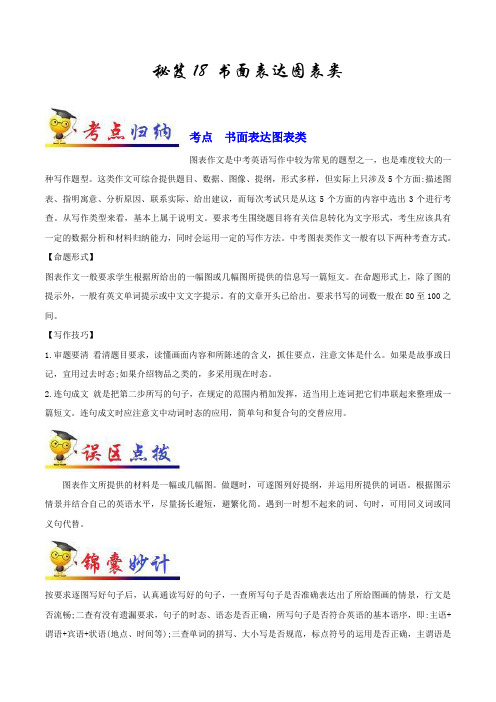
秘笈18 书面表达图表类考点书面表达图表类图表作文是中考英语写作中较为常见的题型之一,也是难度较大的一种写作题型。
这类作文可综合提供题目、数据、图像、提纲,形式多样,但实际上只涉及5个方面:描述图表、指明寓意、分析原因、联系实际、给出建议,而每次考试只是从这5个方面的内容中选出3个进行考查。
从写作类型来看,基本上属于说明文。
要求考生围绕题目将有关信息转化为文字形式,考生应该具有一定的数据分析和材料归纳能力,同时会运用一定的写作方法。
中考图表类作文一般有以下两种考查方式。
【命题形式】图表作文一般要求学生根据所给出的一幅图或几幅图所提供的信息写一篇短文。
在命题形式上,除了图的提示外,一般有英文单词提示或中文文字提示。
有的文章开头已给出。
要求书写的词数一般在80至100之间。
【写作技巧】1.审题要清看清题目要求,读懂画面内容和所陈述的含义,抓住要点,注意文体是什么。
如果是故事或日记,宜用过去时态;如果介绍物品之类的,多采用现在时态。
2.连句成文就是把第二步所写的句子,在规定的范围内稍加发挥,适当用上连词把它们串联起来整理成一篇短文。
连句成文时应注意文中动词时态的应用,简单句和复合句的交替应用。
图表作文所提供的材料是一幅或几幅图。
做题时,可遂图列好提纲,并运用所提供的词语。
根据图示情景并结合自己的英语水平,尽量扬长避短,避繁化简。
遇到一时想不起来的词、句时,可用同义词或同义句代替。
按要求逐图写好句子后,认真通读写好的句子,一查所写句子是否准确表达出了所给图画的情景,行文是否流畅;二查有没有遗漏要求,句子的时态、语态是否正确,所写句子是否符合英语的基本语序,即:主语+谓语+宾语+状语(地点、时间等);三查单词的拼写、大小写是否规范,标点符号的运用是否正确,主谓语是否一致。
确定无误后,再誊写正稿。
A(2019·成都外国语中学初三月考)紫石中学校报英文版正在为其栏目“你所熟悉的身边人”征稿。
请根据下表提供的信息,以“My friend”为题撰写一篇稿件,介绍你的好朋友Lucy。
2023年中考英语二轮复习写作进步一点点
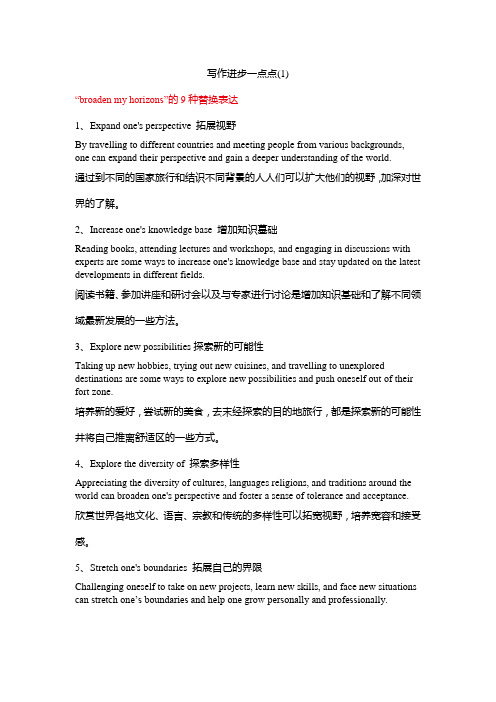
写作进步一点点(1)“broaden my horizons”的9种替换表达1、Expand one's perspective 拓展视野By travelling to different countries and meeting people from various backgrounds, one can expand their perspective and gain a deeper understanding of the world.通过到不同的国家旅行和结识不同背景的人人们可以扩大他们的视野,加深对世界的了解。
2、Increase one's knowledge base 增加知识墓础Reading books, attending lectures and workshops, and engaging in discussions with experts are some ways to increase one's knowledge base and stay updated on the latest developments in different fields.阅读书籍、参加讲座和研讨会以及与专家进行讨论是增加知识基础和了解不同领域最新发展的一些方法。
3、Explore new possibilities探索新的可能性Taking up new hobbies, trying out new cuisines, and travelling to unexplored destinations are some ways to explore new possibilities and push oneself out of their fort zone.培养新的爱好,尝试新的美食,去末经探索的目的地旅行,都是探索新的可能性井将自己推离舒适区的一些方式。
bbnolof人教版(新目标)英语各单元复习资料[精]
![bbnolof人教版(新目标)英语各单元复习资料[精]](https://img.taocdn.com/s3/m/050a459e01f69e31433294f8.png)
、.~①我们‖打〈败〉了敌人。
②我们‖〔把敌人〕打〈败〉了。
九年级英语Unit11. by + doing通过……方式如:by studying with a groupby 还可以表示:“在…旁〞、“靠近〞、“在…期间〞、“用、〞“经过〞、“乘车〞等如:I live by the river. I have to go back by ten o’clock.The thief entered the room by the window. The student went to park by bus.2. talk about 议论,议论,讨论如:The students often talk about movie after class. 学生们常常在课后讨论电影。
talk to sb. === talk with sb. 与某人说话3. 提建议的句子:①What/ how about +doing sth.?如:What/ How about going shopping?②Why don’t you + do sth.?如:Why don’t you go shopping?③Why not + do sth. ? 如:Why not go shopping?④Let’s + do sth. 如:Let’s go shopping⑤Shall we/ I + do sth.?如:Shall we/ I go shopping?4. a lot 许多常用于句末如:I eat a lot. 我吃了许多。
5. too…to 太…而不能常用的句型too+adj./adv. + to do sth.如:I’m too tired to say anything. 我太累了,什么都不想说。
6. aloud, loud与loudly的用法三个词都与"大声"或"响亮"有关。
- 1、下载文档前请自行甄别文档内容的完整性,平台不提供额外的编辑、内容补充、找答案等附加服务。
- 2、"仅部分预览"的文档,不可在线预览部分如存在完整性等问题,可反馈申请退款(可完整预览的文档不适用该条件!)。
- 3、如文档侵犯您的权益,请联系客服反馈,我们会尽快为您处理(人工客服工作时间:9:00-18:30)。
learning
health
...
...
problems
r problems
be tired/stressed out
family and friends
be laughed at
... argue with parents
Can you give me some suggestions ?
2. Write them down on the paper. 3. Choose one to show the reply.
1. Everyone should at least give one suggestion. 2. You can use phrases to show your ideas.
can't get good grades feel nervous and tired
get fat be laughed at
often argue with parents can't get along with friends
What problems do middle school students have?
Expressions of giving suggestions
listen to music talk to your friends go for a walk take some exercise go to see a doctor drink more water take some medicine lie down and have a rest eat healthy food say sorry to him take more exercise …
Do you feel tired?
Do you have any problems in your life or study?
WhAatrearyeouyonuerrvpouros?blems?
Task 1 : Let’s talk:
A: Do you have any problems?
2020中考英语话题七复习
Problems and suggestions 读写复习课
Problems & Suggestions
8B Unit 1 What's the matter? 8B Unit 2 I'll help to clean up the city parks. 8B Unit 3 Could you please clean your room? 8B Unit 4 Why don't you talk to your parents? 9 Unit 3 Could you please tell me where the restrooms are?
What’s the matter/wrong (with…)? What’s your trouble? What happened to….? Do you have a problem? ...
B: Yes, I...
I ... I get/ have/have got... I have a problem of .. I have trouble doing .. I am worried about…. ...
other problems
learning
health
family and friends
too nervous before exams
...
...
too shy to speak in public
getting low marks
be fat
headache
illness
flu fever
be ill/fat /upset/stressed out feel tired/nervous argue with parents too shy to speak in public don't have enough sleep get low marks
Talk about the problems
Task 3: pre-writing
Dear Tom, My name is David. I am a Grade 9 student. I am nervous and tired
recently. As we know, over the past two months, the Novel Corona Virus(新型冠状病毒) has made its way around China. It has a strong impact(影响) on my life and study. I am worried about being infected with the virus . The High School Entrance Examination is coming but I can't concentrate on my study. What's more, I'm putting on my weight. That's terrible! What should I do? Can you offer me some suggestions? They would be most valuable. Thanks a lot. Yours, David
Learning Goals: 1. Knowledge Objects:
We’ll review some useful expressions 2. Skill Objects:
We’ll be able to improve our listening, speaking and writing skills. 3. Moral Objects: We will be able to help others solve problems.
Task 2:
How to give Advice ?
Every student has different problems. It is that_______.
problems
suggestions
Brainstorm suggestions
1. Discuss your replies on the problem you choose.
